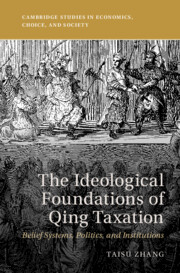Book contents
- The Ideological Foundations of Qing Taxation
- The Ideological Foundations of Qing Taxation
- Copyright page
- Dedication
- Contents
- Statistical Tables
- Preface
- Acknowledgments
- Introduction
- 1 A Short History of Qing Taxation
- 2 The Uses and Limitations of Rationalist Explanations
- 3 Pre-Qing Fiscal Regimes
- 4 The Early Qing Paradigm Shift
- 5 Mid-Qing Entrenchment
- 6 Late Qing Reforms
- 7 Theoretical Implications
- Conclusion
- Abbreviations of Sources
- References
- Index
6 - Late Qing Reforms
Published online by Cambridge University Press: 02 February 2023
- The Ideological Foundations of Qing Taxation
- The Ideological Foundations of Qing Taxation
- Copyright page
- Dedication
- Contents
- Statistical Tables
- Preface
- Acknowledgments
- Introduction
- 1 A Short History of Qing Taxation
- 2 The Uses and Limitations of Rationalist Explanations
- 3 Pre-Qing Fiscal Regimes
- 4 The Early Qing Paradigm Shift
- 5 Mid-Qing Entrenchment
- 6 Late Qing Reforms
- 7 Theoretical Implications
- Conclusion
- Abbreviations of Sources
- References
- Index
Summary
Chapter 6 takes the narrative from the Taiping Rebellion and its aftermath to the end of the dynasty. By the mid-nineteenth century, the traditional moral consensus that state taxation was inherently wrong had largely crumbled, and many of the most prominent statesmen in the country now openly embraced a new, pro-government investment mode of thinking. Nonagricultural taxes almost immediately began to expand rapidly once the Taiping Rebellion flared up in 1851, and continued to rise after it had been put down, despite the significant amount of political controversy and opposition that this generated throughout the later nineteenth century. At the same time, however, the “realist” assumption that the peasantry would not tolerate higher agricultural tax quotas remained firmly entrenched, unaffected - and even strengthened - by Taiping-era socioeconomic crises. Provincial land surveying made an institutional comeback in the late nineteenth century, but not until the Qing Court faced a complete fiscal collapse in the aftermath of the Boxer Rebellion (1899-1901) did it finally throw caution to the wind and begin to systemically experiment with higher agricultural tax quotas. To the surprise of many contemporaries, these experiments were largely successful, and while they came much too late to save the Qing from political collapse, they nonetheless laid the intellectual and political foundations for a more robust tax regime in the Republican era and the People’s Republic.
Keywords
Information
- Type
- Chapter
- Information
- The Ideological Foundations of Qing TaxationBelief Systems, Politics, and Institutions, pp. 267 - 318Publisher: Cambridge University PressPrint publication year: 2023
